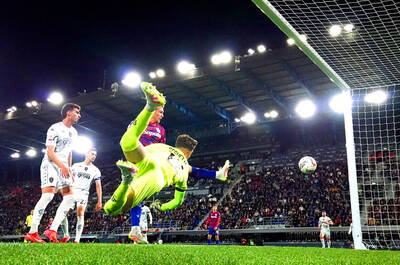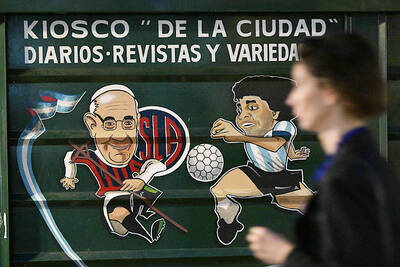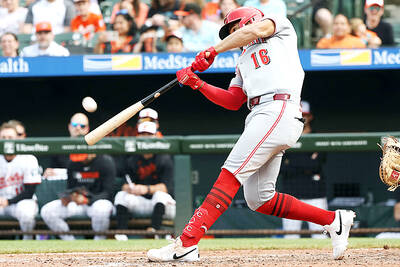David Kinjah saw something in Chris Froome way before anyone else. The skinny boy who had “lots of energy.” Too much energy for his mother.
The first signs of a future Tour de France leader and probable winner were not up in the snow-capped Alps or through the rugged Pyrenees, but on a baking hot East African road where an overeager teenager showed a bunch of seasoned riders what he was about.
Still a relative beginner on a bike, Froome, who was about 15, was with Kinjah and others for a 150km ride from Kenya’s capital, Nairobi, down to a remote town near the Tanzania border in the southwest. A dusty, energy-sapping trek on an undulating tarmac surface in the steamy Rift Valley and with the dry, rasping wind nagging at you.
The kid was meant to stop at the 75km mark and jump in a chase car driven by his mother. That would have been good enough, but he refused and stubbornly rode on.
About 40km later, the young Froome’s body had enough. He had passed the point of exhaustion and Kinjah saw him veering off the road toward a bush, unable to control his bike anymore. He still wanted to go on.
“Chris’ character has not changed much,” Kinjah, Froome’s first cycling mentor, said, recalling that early ride. “He is still the same determined young boy that I knew. He is not the kind of guy who gives up, and if he falls he quickly stands up and tries again. He does not go [get] angry with people, he goes [gets] angry with himself and that is one of the things that you can even see now.”
It was foolish, maybe, but the dogged determination that took Froome to his very limits over a decade ago stuck in the memory of Kinjah, at that time Kenya’s most accomplished rider.
Born to British parents in the former colony, Froome’s excess energy was why his mother introduced him to the seasoned cyclist.
His parents had separated and Froome spent his time shuttling between Kenya and school in South Africa, where his father had moved. His mother could not keep up when he came back for holidays, Kinjah said, and cycling became the outlet.
“He was having lots of energy. It was a difficult part of his life, of her life, and Chris, the young boy ... he was very outgoing,” Kinjah said.
So the Kenyan villager became the first influence on the rider who is at the center of the sport this week and on course to claim its biggest title in Paris on Sunday.
Froome the cyclist was formed in the hills outside Nairobi, riding with Kinjah past coffee and tea plantations, and through dirt tracks in lush forests near Kinjah’s tiny home village of Mai-I-Hii.
Mixing between whites and blacks was still pretty rare outside the big city and the villagers did not know what to make of the young white boy who came to ride with the older black man. Kinjah said Froome was like his little brother back then.
Now, he sees his protege getting stronger and stronger in the climax to this year’s Tour.
“There is still a lot of big, hard stages coming up, big mountains, and that is where Chris Froome does really well, you know,” Kinjah said. “He is a fighter on the climbs. You know, when the stages get longer and harder, he gets better and better.”
Kinjah also said he knows Froome well enough to believe doping is not the reason for his powerful, almost unstoppable ride at the Tour. Like his competitors, suspicions have chased Froome in nearly every stage because of the cloud that constantly hangs over cycling.
“We talked about this thing [doping] many times when he became a strong rider, when he would come here for holidays from South Africa, where he saw some cyclists spoiling their bodies doping,” Kinjah said. “The Tour de France is about mental strength, hard work, preparation and determination, and that is what Chris is about. In short, there is no doping there.”
Froome’s metamorphosis from a skinny, but spirited kid who found something in cycling, to the winner of its biggest race is nearly complete.
Kinjah has watched every stage of the Tour de France from his two-room home, where bicycles hang from the sheet metal roof and a group of young riders also gather around the television to see Froome — who started where they are now — lead and maybe win the race that is the pinnacle of the sport.
“We hope that he will finish on the podium with the yellow jersey, which is really visible right now,” Kinjah said.
Watching one stage, 18-year-old Vincent Chege turned to the group and said: “In the next two years, I will be there, you guys just wait.”

Bologna on Thursday advanced past Empoli to reach their first Coppa Italia final in more than half a century. Thijs Dallinga’s 87th-minute header earned Bologna a 2-1 win and his side advanced 5-1 on aggregate. Giovanni Fabbian opened the scoring for Bologna with a header seven minutes in. Then Viktor Kovalenko equalized for Empoli in the 30th minute by turning in a rebound to finish off a counterattack. Bologna won the first leg 3-0. In the May 14 final in Rome, Bologna are to face AC Milan, who eliminated city rivals Inter 4-1 on aggregate following a 3-0 win on Wednesday. Bologna last reached the

If the Wild finally break through and win their first playoff series in a decade, Minnesota’s top line likely will be the reason. They were all over the Golden Knights through the first two games of their NHL Western Conference quarter-finals series, which was 1-1 going back to Minnesota for Game 3 today. The Wild tied the series with a 5-2 win on Tuesday. Matt Boldy had three goals and an assist in the first two games, while Kirill Kaprizov produced two goals and three assists. Joel Eriksson Ek, who centers the line, has yet to get on the scoresheet. “I think the biggest

From a commemorative jersey to a stadium in his name, Argentine soccer organizers are planning a slew of tributes to their late “Captain” Pope Francis, eulogized as the ultimate team player. Tributes to the Argentine pontiff, a lifelong lover of the game, who died on Monday at the age of 88, have been peppered with soccer metaphors in his homeland. “Francisco. What a player,” the Argentine Football Federation (AFA) said, describing the first pope from Latin America and the southern hemisphere as a generational talent who “never hogged the ball” and who showed the world “the importance of having an Argentine captain,

Noelvi Marte on Sunday had seven RBIs and hit his first career grand slam with a drive off infielder Jorge Mateo, while Austin Wynn had a career-high six RBIs as the Cincinnati Reds scored their most runs in 26 years in a 24-2 rout of the Baltimore Orioles. Marte finished with five hits, including his eighth-inning homer off Mateo. Wynn hit a three-run homer in the ninth off catcher Gary Sanchez. Cincinnati scored its most runs since a 24-12 win against the Colorado Rockies on May 19, 1999, and finished with 25 hits. Baltimore allowed its most runs since a 30-3 loss to